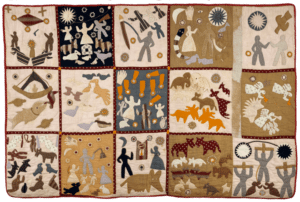Clarissa “Clara” Barton is most widely acknowledged as the founder of the American branch of the Red Cross. Her life’s work cemented her as one of the most important figures in the history of social work and nursing alike, and millions of people from across the globe have benefited from her contributions to American healthcare. She began her lifetime of service at the beginning of the Civil War, where she arranged medical care for Union troops who were wounded in the 1861’s Baltimore Riots.
Born into a middle-class family from Oxford Massachusetts, Barton began her career as many women of the time did, working as a school teacher. When the war began in 1861, however, she had moved to Washington D.C. where she worked as a clerk in the United States Patent Office–the first woman in U.S. history to hold this position in the Federal Government.
[bctt tweet=”I shall never do a man’s work for less than a man’s pay. ~ Clara Barton” username=”womeninhistory”]
Seeing a need to help Union soldiers, Barton accompanied the military in an era where women had previously never been allowed to join army camps or hospitals. Barton spent the next few years nursing wounded soldiers and providing them with supplies, often at risk to her own life. In one battle, Barton’s arm was grazed, killing the wounded man she was attempting to nurse back to health. While serving in the army, Barton contracted typhoid fever, but later fully recovered.

It was her work during the Civil War which laid groundwork for her most notable role as founder of the American Red Cross, efforts she began in 1881.
On a doctor prescribed leave of absence from war efforts, Barton took a trip to Europe in 1869. While traveling, Barton discovered the International Red Cross, where she observed volunteers aiding in the Franco-Prussian War. She then saw the need to bring the organization to the United States, and founded the American branch. Barton expanded the American branch of the Red Cross, to include not only wartime aid, but volunteers also assisted with natural disasters.
Under Clara’s leadership, the American Red Cross’s work aided in several peacetime endeavors, including aiding communities affected by the Mississippi and Ohio River floods, the Texas famine of 1886, the yellow fever epidemic in Florida, an earthquake which devastated communities in Illinois in 1888, as well as the infamous 1889 Johnstown Pennsylvania flood. By expanding the Red Cross’s service, she inspired other countries to adopt peacetime aid, and as a result the Geneva Convention adopted what is known as the “American Amendment” to its charter in 1884, in order to make peacetime aid an official purpose of the International Red Cross.
[bctt tweet=”I may be compelled to face danger, but never fear it ~ Clara Barton” username=”womeninhistory”]
In addition to leading the Red Cross, Barton continued to travel and speak out on what would today be considered left-wing ideologies, such as education reform, prison reform, women’s suffrage, civil rights, and even spiritualism. She was a skilled speaker; it was reported that the men and women attended her lectures were often moved to tears while listening to her describe her experiences in war.
For all of her accomplishments and strengths, Barton faced criticism of her management style, and increasing age caused Barton to resign as president of The American Red Cross in 1904.

Barton spent her remaining days creating a new organization, which she called the National First Aid Association of America. Although short lived, the organization emphasized basic first aid instruction, emergency preparedness, and the distribution of first aid kits. She also penned several books both about her personal life and the beginnings of The American Red Cross. Barton passed away at her home in Glen Echo, Maryland, on April 12, 1912.
The impact of Barton’s contributions to society have been far reaching, especially her efforts in bringing the International Red Cross to the United States. The American chapter of the Red Cross has greatly expanded, now including more than 20,000 volunteers, and their disaster response nurses play an important role in their communities both in peacetime and in war, helping communities in many nations recover from natural disasters, terrorist acts, and industrial accidents.
Recommended Reading



Danika is a writer and musician from the northwest who sometimes takes a 30 minute break from feminism to enjoy a tv show. You can follow her on twitter @sadwhitegrrl.





Leave a Reply